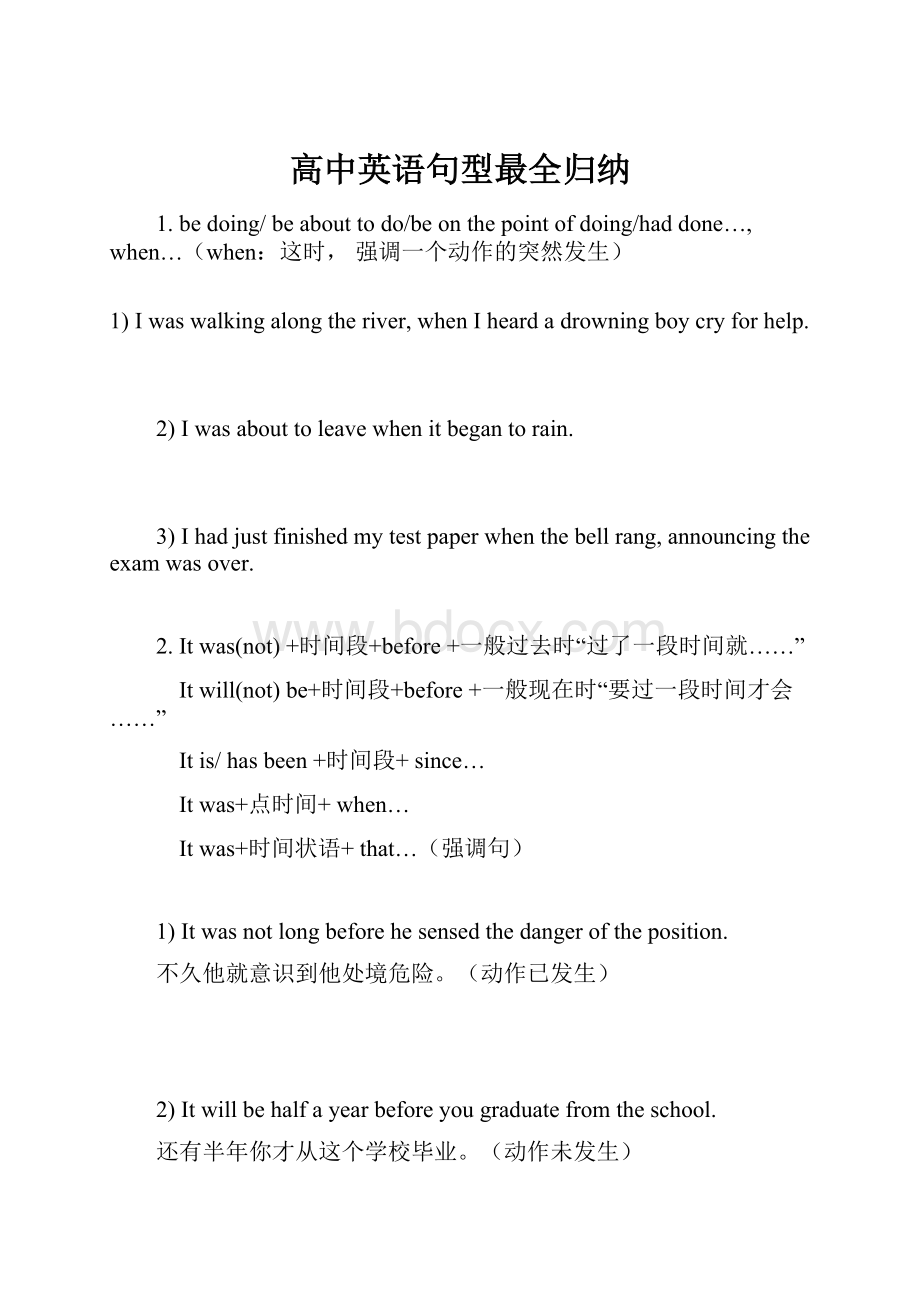高中英语句型最全归纳.docx
《高中英语句型最全归纳.docx》由会员分享,可在线阅读,更多相关《高中英语句型最全归纳.docx(20页珍藏版)》请在冰豆网上搜索。

高中英语句型最全归纳
1.bedoing/beabouttodo/beonthepointofdoing/haddone…,when…(when:
这时,强调一个动作的突然发生)
1)Iwaswalkingalongtheriver,whenIheardadrowningboycryforhelp.
2)Iwasabouttoleavewhenitbegantorain.
3)Ihadjustfinishedmytestpaperwhenthebellrang,announcingtheexamwasover.
2.Itwas(not)+时间段+before+一般过去时“过了一段时间就……”
Itwill(not)be+时间段+before+一般现在时“要过一段时间才会……”
Itis/hasbeen+时间段+since…
Itwas+点时间+when…
Itwas+时间状语+that…(强调句)
1)Itwasnotlongbeforehesensedthedangeroftheposition.
不久他就意识到他处境危险。
(动作已发生)
2)Itwillbehalfayearbeforeyougraduatefromtheschool.
还有半年你才从这个学校毕业。
(动作未发生)
3)Itis3yearssinceheworkedhere.=helefthere.(since从句中的谓语动词若是延续性动词,要从这个动作结束的时候算起)
4)Itwas3o’clockwhentheyreceivedthetelephone.
5)Itwasat3o’clockthattheyreceivedthetelephone.
3.once…一旦……,表示时间和条件
1)Onceyoustart,youwillnevergiveup.
2)Onceyouunderstandwhattheteacherexplained,youwillhavenodifficultydoingthework.
4.the+比较级……,the+比较级……“越……越……”
Themorebooksyouread,themoreknowledgeyouwillget.
5.whether…or…无论是……还是……
1)Whethertheweatherisgoodorbad,theywillsetoffastheyplanned.
2)Anyperson,whetheryoungorold,hashisownworth.
6.祈使句+or/otherwise+结果句或祈使句+and+结果句
1)Stopdoingsuchafoolishthing,oryouwillbepunishedintime.
2)Moreeffort,andtheproblemwouldhavebeensettled.
7.everytime/eachtime/nexttime/thefirsttime/anytime等短语引导时间状语从句,表示“每当,每次,下次,第一次,任何时候”。
1)Everytimeyoumeetwithnewwordswhilereading,don’talwaysrefertoyourdictionary.
2)Nexttimeyoucome,doremembertobringyoursonhere.
3)Youarewelcometocomebackanytimeyouwantto.
8.Thereis(no)needtodo…
Thereis(no)hope/chance/possibilityofdoing…
Thereis(no)difficulty/trouble/point/delay(in)doing
1)Isthereanychanceofourwinningthematch?
2)Thereisnopointindiscussingtheproblemagain.
9.it强调句:
基本构成形式:
Itis/was+被强调部分+who/that+原句剩余部分
Imethiminthestreetyesterdayafternoon.
ItwasIwho/thatmethiminthestreetyesterdayafternoon.(强调是我,不是别人)
ItwasinthestreetthatImethimyesterdayafternoon.(强调是在大街上,不是在别的地方,强调的是地点,但不用where)
ItwasyesterdayafternoonthatImethiminthestreet.(强调是昨天下午,不是在别的时候,强调的是时间,但不用when)
10.not...until直到……才
1)Thevillagersdidn’trealizehowseriousthepollutionwasuntilallthefishdiedintheriver.
2)Itwasnotuntilallthefishdiedintheriverthatthevillagersrealizedhowseriousthepollutionwas.(强调句)
3)Notuntilallthefishdiedintheriverdidthevillagersrealizehowseriousthepollutionwas.(倒装句)
11.notonly…but(also)…
引导并列结构:
作主语时,谓语动词与邻近的一个主语保持一致。
Notonlytheteacherbutalsothestudentshavetheireyesexaminedregularly.
notonly...but(also)…引导并列句时,notonly引导的部分置于句首时要部分倒装。
1)Notonlywaseverythinghehadtakenaway,butalsohisGermancitizenshipwastakenaway.
2)Notonlyshouldwestudentsstudyhard,butalsoweshouldknowhowtoenjoyourselvesinoursparetime.
12.wouldrather+从句(从句要用虚拟语气,即从句中谓语动词用一般过去式,表示现在或将来的愿望;从句中谓语动词用过去完成市,表示对过去的愿望)
1)I’dratheryoupostedtheletterrightnow.我想让你现在就把信寄出去。
2)I’dratherIhadn’tseenheryesterday.我情愿昨天没见到她。
13.so,neither/nor引导得倒装
表示“另一者也如此”及前者的情况也适用于后者,用so,neither/nor引导的倒装句,助动词的选择依据前一句的谓语动词。
1)Hehasfinishedhishomework,sohaveI.
2)Mysisterpreferscoffee,sodoI.
3)Johncan’trideabicycle,neither/norcanI.
若前句的谓语动词既有肯定又有否定形式时,或谓语动词不属于一类时,用Itis/wasthesamewithsb.或Soitis/waswithsb.
1)Heisaworkerandheworkshard,soitiswithJohn.
若后一句是对前一句所说的内容表示赞同或认可,则主语和谓语不倒装。
1)—Itiscoldtoday.—Yes.Soitis
2)—HevisitedTokyolastweek.—Yes.Sohedid.
14.倍数表达法:
A+谓语+倍数+the+n.(size/height/length…)+ofB
A+谓语+倍数+as+abj.+asB
A+谓语+倍数+adj.比较级+thanB
A+谓语+adj.比较级+thanB+by+倍数
1)Thissquareistwicethesizeofthatone.
Thissquareistwiceaslargeasthatone.
Thissquareisoncelargerthanthatone.
2)Thisfactoryproducedthreetimesasmanycarsastheydid10yearsago.
3)Heis3yearsolderthanI
HeisolderthanIby3years.
15.as/with表示“随……进展”,as后面接句子,with后面接短语。
1)Withtheindustrydeveloping,thepollutionisbecomingmoreandmoreserious.
2)Astheindustrydevelops,thepollutionisbecomingmoreandmoreserious.
16.with的复合结构(作状语或作定语)
with+n.+adj.(with可以省略)
1)(With)thestreetwetandslippery,wehadtorideourbikesslowlyandcarefully.
Becausethestreetwerewetandslippery,…
2)Thestudentswerelisteningtotheteacher,(with)theireyeswideopen.
Thestudentswerelisteningtotheteacher,andtheireyeswerewideopen.
with+n.+adv.(with可以省略)
1)Heputonhiscoathurriedly,(with)thewrongsideout.
with+n.+prep-phrase(with可以省略)
1)Theoldmanwasseatedinthesofa,(with)apipeinhismouth.
with+n.+todo/tobedone(动词不定式的动作还未进行)
with+n.+doing/beingdone(动词不定式的动作正在进行)
with+n.+done(动词不定式的动作已经完成或指n.所处的状态)
1)Withsomanyproblemstosettle,thenewly-electedpresidentishavingahardyear.
2)Hewaslyinginbed,withhiseyesfixedontheceiling.
3)Withthetemplebeingrepaired,wecan’tvisitedit.
17.以here,there,in,out,up,down,away等副词开头的倒装句(多用一般现在时表示正在进行的动作)。
1)Herecomesthebus!
(=Thebusiscominghere!
)
2)Awayhewent.他走远了。
(若主语是代词则主语与谓语不倒装)
18.方位状语位于句首时的倒装句。
1)Infrontofthehousestoppedapolicecar.
2)Underthetreesataboy,withabookinhishand.
19.具有否定意义的副词或短语位于句首时句子要部分倒装。
常用的有:
little,never,seldom,hardly,rarely,nosooner,innotime,bynomeans,innocase等。
20.themoment,theminute,immediately,directly,ondoing…表示“一……就”
1)Onarriving(hisarrival)attheairport,hewassurroundedbythereporters.
2)—HaveyougiveJohnthebook?
—Yes,themomentIsawhim.
21.while/but:
while侧重两者之间的对比,but多指一件事的两个对立面。
1)HelikeslisteningtomusicwhileIlikewatchingTV.
2)Ibadlywantedthatbook,butIhaven’tenoughmoney.
22.onlytodo作结果状语,多用来表示出人意料、结局令人沮丧的结果。
动词多是终结性的词,如:
find,learn,tobetold,tobecaught等。
1)Hisfatherdisappeared,nevertobeheardfromagain.
2)Hehurriedtohisoffice,onlytobetoldthathewasdismissed.
23.only+状语的结构放在句首,主句要部分倒装。
1)Theteachertoldmethatonlyinthatway,couldIlearnEnglishwell.
2)Ireceivedmymother’scallat11a.m.,onlythendidIrememberitwasmybirthdaytoday.
24.taste,smell,look,sound,feel等感官动词作为系动词后面要接adj.作表语。
1)Appleofthiskindtastesverynice.
2)Smellingnice,thiskindofbreadsellswell.
25.有些动词常用作不及物动词与well或easily连用,表示某物具备的某种特征,常用的词有sell,cut,wash,last,burn等。
1)Hislatestworksellswell.
2)Drywoodburnseasily.
26.否定词与比较级连用,表达最高级的含义。
1)Ihaveneverseenabetterfilm.
2)Ican’tagreeyoumore.我非常同意。
27.It的句型
不定式作主语,it作形式主语:
It+系动词+adj./n.+forsb.todo(forsb.表示动词不定式动作的执行者)
It+系动词+adj.+ofsb.todo(ofsb.既表示动词不定式动作的执行者又表示人所具备的性质或特征)
1)It’simportantforustohaveagoodknowledgeofEnglish.
2)It’sthoughtfulofhimtofixusupforthenight.
不定式作宾语,it作形式宾语:
主语+think/consider/believe/make/feel+it+adj./n.+forsb./ofsb.+todo
1)Ifeelitfoolishofhimtobelievesuchaman.
2)Thetimelyrainhadmadeitpossibleforthecropstogrowwell.
Itissaid/thought/hoped/believed…that…
Sb.issaid/thought/hoped/believedtodo…
1)Itissaidthatheisstudyingabroad.—>Heissaidtobestudyingabroad.
2)ItisconsideredthatmanycountrieshighlyvalueChina’sroleinhelpingworld’speace.
=ManycountriesisconsideredtohighlyvalueChina’sroleinhelpingworld’speace.
Itistimetodo/Itistimethat+主语+动词的一般过去式,表示该是做…….的时候了。
1)Itistimethatweendedthediscussion.
28.虚拟语气中的重点句型
If+were/did(动词过去式),主语+情态动词(would,could,might,should)+do(用来表示对现在情况的假设)
①Idon’thaveacellphone.IfIhadone,itwouldbeconvenientformetocontractothers.
If+haddone(过去完成式),主语+情态动词(would,could,might,should)+havedone(用来表示对过去情况的假设)
②IfIhadgonetotheconcert,Iwouldhaveseenthefamoussinger.
If+were/did(动词过去式)/weretodo/shoulddo,主语+情态动词(would,could,might,should)+do(用来表示对将来情况的假设)
③IfIwerenottotake/shouldtake/tooktheexamtomorrow,Iwouldgoshoppingwithyou.
虚拟语气条件句的倒装:
在虚拟语气条件句中,如果出现助动词were,should,had,可省略if,把这些词提到主语前面,变成倒装句。
①Shouldheactlikethatagain,hewouldbefined.(Ifheshouldactlikethatagain,…)
Werehetoactlikethatagain,hewouldbefined.(Ifheweretoactlikethatagain,…)
***Ifheactedlikethatagain,…(不可以倒装)
②Hadthedoctorcomeintimelastnight,theboywouldhavebeensaved.(Ifthedoctorhadcomeintimelastnight,…)
③IfIhadtimenow,Iwouldgotothefilmwithyou.(不可以倒装,因为句中的had不是助动词)
Butfor…-->Ifitwerenotfor…/Ifithadn’tbeenfor
①Butforthedeterminedcaptain,allthepassengersonboardwouldn’thavebeensaved.(Ifithadn’tbeenforthedeterminedcaptain,allthepassengersonboard…)
②Butforyourrichparents,youwouldn’tlivesuchaneasylife.(Ifitwerenotforyourrichparents,youwouldn’tlivesuchaneasylife.
在suggest,insist,demand,require,request,order,advise,propose等表示建议、要求、命令、主张的动词引导的名词性从句中,从句的谓语动词要用(should)do的形式。
①MotherinsistedthatJohn(should)gotobedbefore9o’clock.
对比:
HeinsistedthatIhadtakenawayhisdictionary.(不是建议、要求、命令或主张)
②HissuggestionthatTony(should)beinvitedto